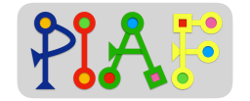Integrating information and communication technologies into citizen’s everyday life calls for an informed and thoughtful usage. Understanding what lies behind technologies, how to control them, whether in everyday life or in a professional context, needs a training from early years on. To guarantee equity between future citizens, education must be part of the change. It should offer activities to reach these goals. Strangely, current curricula are only starting to focus on developing these skills.
Algorithmic and Computational Thinking (ACT) is the ability to handle complex problems, to decompose them into sub-problems, and to propose partially or fully automatic solutions. Underlying competencies can be developed in fundamental education. But, for this to happen, teachers need to be trained to designing and leading such teaching activities in their classes.
For this reason, the PIAF project gathers researchers from four European countries (Belgium, France, Germany and Luxembourg) with the aim to develop competencies in teachers, so that they can propose learning activities related to the development of computational thinking in pupils, from elementary school on. A conceptual framework, and a referential of competencies, validated by various actors (researchers, teachers, education counsellers) will be defined. Building on data and experiences from different but complementary national contexts will bring a more solid validity to the creation of activities fitting learners’ needs, realised through a participative design process.
To know more about PIAF : project’s notice on the EU portal.
